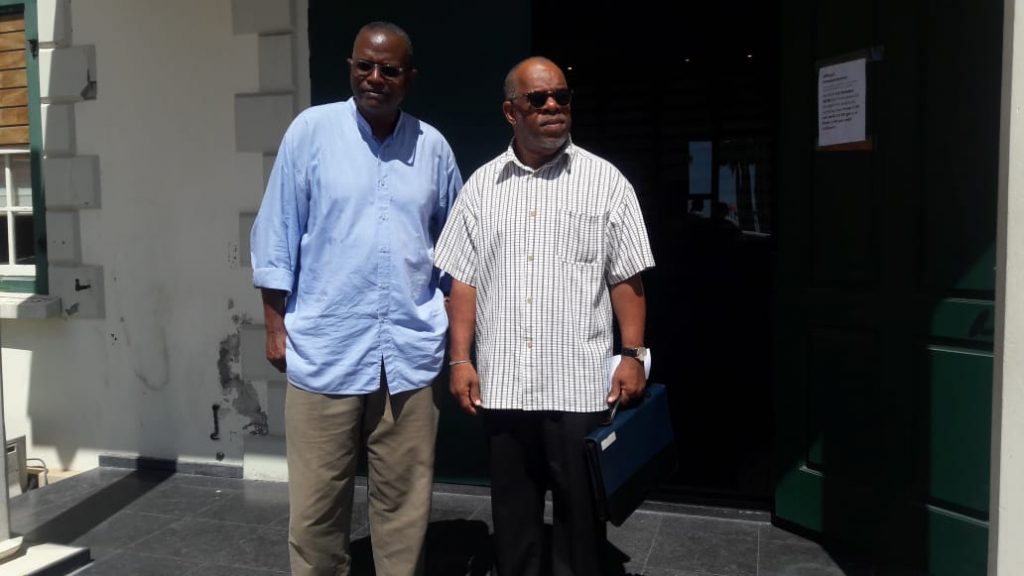Foundation asks court to declare Kingdom Charter unlawful

PHILIPSBURG – The Pro Soualiga Foundation, a vehicle established by attorney Denicio Brison, is taken the State of the Netherlands to court in an attempt to have the Kingdom Charter of 1954 declared null and void. The foundation also demands that the Netherlands registers St. Maarten on the United Nations list of non-self-governing territories and to ‘cease and desist’ from the proposed consensus Kingdom Law Caribbean Reform Entity. The petition sets December 31, 2020, as the deadline for its demands.
Related: Caribbean Reform Entity
In its 37-page petition to the court, the foundation goes to great length in its attempt to substantiate why the Kingdom Charter ought to be declared null and void. ”Because the United Nations has refused to declare that the right to self-determination has been exercised, the Charter has been established in violation of the right to self-determination,” the foundation claims.
That claim does not stand on solid ground it appears from a court ruling of October 22, 2019. Clyde van Putten and four other members of the Island Council and the Executive Council of Statia attempted in that case to declare the Law Pubic Entity BES (WolBES) and the law Public Finances BES (FinBES) unlawful. According to a motion approved by the Island Council on May 8, 2017, these laws were “in conflict with Statia’s right to a full measure of self-government as outlined in the Charter of the United Nations and its relevant resolutions.”
The Ministry of Home Affairs reacted with the installation of a committee. Its task was to assess what was going on in Statia and its conclusions were devastating. The committee found that Statia had grossly neglected its administrative responsibilities. The report spoke of “lawlessness, financial mismanagement, ignoring other legal authorities, discrimination, intimidation and the pursuit of personal power.”
In 2018, State Secretary Knops introduced the Temporary Law Task Neglect Statia, removed commissioners and Island Council members from their positions and appointed a state commissioner.
Van Putten and his co-plaintiffs asked the court to declare that these actions by the Netherlands were unlawful. Furthermore, they claimed that the Netherlands had committed a coup d’état and that “due to its historic pattern of colonial misbehavior it was unfit to supervise the people of Statia.” To put some more emphasis on their complaint, Van Putten c.s. told the court “that the state was still capable of violent and murderous actions.”
But the court wanted none of these arguments and it declared the Temporary Law lawful. “There is no factual basis for the demands. There was gross administrative neglect and the state had to intervene.”
The court ruling also refers to UN Resolution 1514 about self-governing: “Non-self-governing territories can be said to have reached a full measure of self-governance through free association with an independent state.”
With a reference to the establishment of the Kingdom Charter the court ruling states: “Statia has reached a full measure of self-governance in 1954.” This appears also from UN resolution 945 which states among other things: “Takes note of the documentation submitted, and of the explanation provided, to the effect that the peoples of the Netherlands Antilles and Suriname have expressed through their freely elected representative bodies, their approval of the new constitutional order, and takes note also of the opinion of the government of the Netherlands.”
The court ruled that Statia, as part of the Netherlands Antilles, reached its full measure of self-governance in 1954 when the Kingdom Charter was established. “It is a fact that the population of Statia, as part of the Netherlands Antilles, has exercised its right to self-determination during the establishment of the Kingdom Charter. It has freely chosen not to become an independent state but to become part of the legal order within the Kingdom, as established in the Kingdom Charter.”
The court furthermore pointed out that the Executive Council of Statia accepted the status of Dutch public entity on September 9, 2010. “A lower government cannot unilaterally declare decisions of a higher government invalid.”
This court ruling seems to fly straight into the face of the demands made by the Pro Soualiga Foundation. In its petition to the court, the foundation states rather presumptuous: “The right to self-determination belongs to “peoples” and the foundation represents those people.”
The foundation maintains that the Netherlands Antilles did not exercise its right to self-determination when the Kingdom Charter was established, but the 2019 court ruling of Van Putten c.s. versus the State of the Netherlands clearly rejects that opinion.
The Pro Soualiga Foundation includes in its petition to the court a proposal to establish a Development Foundation to replace the World Bank trust fund and the proposed Caribbean Reform Entity.
“This foundation can disburse funds to whomever it chooses,” Secretary Brison states in the petition. He furthermore claims that the foundation could “rebuild the prison without the involvement of St. Maarten’s government bureaucracy” and that it could “disburse whatever amount it considers appropriate” as salaries to ministers and members of parliament, “without even having to discuss it with them.”
Whether the parliament would even consider the establishment of such a foundation (that would be staffed with two Dutch representatives and one from St. Maarten to give the Netherlands full control) is another question altogether.
###
Referenced articles: Clyde van Putten/St. Eustatius dossier


























